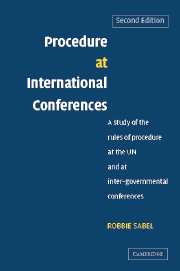 Procedure at International Conferences
Procedure at International Conferences Book contents
- Frontmatter
- Contents
- Preface to the second edition
- List of abbreviations and conference references
- Introduction
- 1 Historical development of rules of procedure of conferences and attempts to establish model rules
- 2 Adoption of rules of procedure
- 3 Rules of procedure and international law
- 4 Invitations, participation and credentials
- 5 Presiding officer and other officers of the conference
- 6 Meetings
- 7 Statements by delegations
- 8 Submission of proposals
- 9 Adjournment and closure of debate
- 10 Amendments
- 11 Withdrawal and reconsideration of motions
- 12 Procedural motions and points of order
- 13 Priorities between different proposals
- 14 Decision taking and method of voting
- 15 Majority required
- 16 Consensus
- 17 Separate votes
- 18 Conduct of voting – interruption of voting and correction of vote
- 19 Languages, records and documents
- 20 Committees
- 21 Suspension and amendment of rules of procedure
- Bibliography
- Index
1 - Historical development of rules of procedure of conferences and attempts to establish model rules
Published online by Cambridge University Press: 22 July 2009
- Frontmatter
- Contents
- Preface to the second edition
- List of abbreviations and conference references
- Introduction
- 1 Historical development of rules of procedure of conferences and attempts to establish model rules
- 2 Adoption of rules of procedure
- 3 Rules of procedure and international law
- 4 Invitations, participation and credentials
- 5 Presiding officer and other officers of the conference
- 6 Meetings
- 7 Statements by delegations
- 8 Submission of proposals
- 9 Adjournment and closure of debate
- 10 Amendments
- 11 Withdrawal and reconsideration of motions
- 12 Procedural motions and points of order
- 13 Priorities between different proposals
- 14 Decision taking and method of voting
- 15 Majority required
- 16 Consensus
- 17 Separate votes
- 18 Conduct of voting – interruption of voting and correction of vote
- 19 Languages, records and documents
- 20 Committees
- 21 Suspension and amendment of rules of procedure
- Bibliography
- Index
Summary
Development of conference rules of procedure
Sohn points out that at the 1868 Geneva Conference ‘a distinction seems to have been made for the first time between matters of substance and questions of procedure’. The Congress of Berlin of 1878 however is usually regarded as the first conference where a clear distinction was made between decisions on substance and those of procedure. It was there that Bismarck declared:
In the interest of accomplishment, resolutions concerning procedure not touching questions of substance should be held to be decisions of the Congress when approved by a majority vote, unless the minority should register formal protest.
Despite these two examples and additional cases of adoption of ad hoc procedural decisions, Pastuhov writes that it ‘was not the practice of diplomatic conferences held prior to the twentieth century to adopt formal rules of procedure for conducting their business’. Although the First Hague Conference of 1899 voted on procedural issues, it did not have a formal set of rules of procedure; the first conference with a formal set of rules of procedure appears to have been the Second Hague Conference of 1907. The rules of the Second Hague Conference consisted of twelve short articles dealing with the structure and organisation. Only two of the articles dealt with the process of conduct of business and voting.
Information
- Type
- Chapter
- Information
- Procedure at International ConferencesA Study of the Rules of Procedure at the UN and at Inter-governmental Conferences, pp. 7 - 18Publisher: Cambridge University PressPrint publication year: 2006